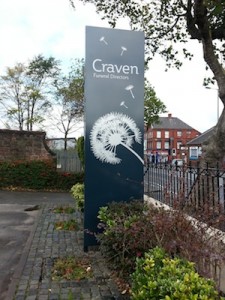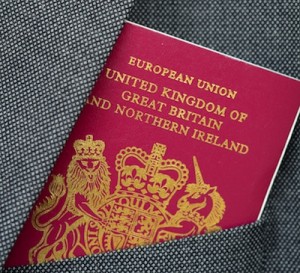 We know that it can be a huge shock when a loved one passes away. Even if the death is expected, there will inevitably be a long period of grief following their death.
We know that it can be a huge shock when a loved one passes away. Even if the death is expected, there will inevitably be a long period of grief following their death.
During that time, you have a large number of tasks to carry out, and will hear a lot of terminology that you probably haven’t encountered before. Below we provide a helpful guide to some of the initial procedures and actions you may need to carry out immediately after someone dies.
What happens when someone dies
If someone dies in a hospital, the hospital will contact the person’s next of kin and will keep them in the mortuary until they are taken away. If the death happens out of a hospital, you will need to contact the doctor who cared for the deceased if the death was expected. They will confirm the cause of death and provide you with a medical certificate showing the cause of death. This will be free of charge, and will be in an envelope addressed to the registrar.
They will also provide you with a formal notice saying the doctor has signed the medical certificate and informing you how to register the death. However, if the death is unexpected or sudden, you need to contact the family doctor, their nearest relative, or the police if you don’t know who these people are. If the cause of death is not clear, then the doctor must report it to the coroner who may then decide if there needs to be a post-mortem or inquest.
Coroners, post mortems and inquests
Coroners are responsible for investigating sudden, violent, unnatural or suspicious deaths. This includes deaths that happened in prison or police custody and deaths where the causes are unknown. The coroner is a lawyer or a doctor. If any of the above applies, the doctor will write on the formal notice that they have referred the death to the coroner, and only the coroner will be able to confirm the cause of death.
A post-mortem is a medical examination of a body which aims to find out more about the cause of death. Relatives’ permission is not required for a postmortem to be carried out. A post-mortem should not delay when you can have a funeral. An inquest is a fact finding inquiry, held in public, sometimes with a jury, designed to find out the medical cause and circumstances of a death. Inquests are held if the death was violent, if the cause of death was unknown, unnatural, if it was caused by a workplace disease, or if the person died in prison.
It is up to the coroner to decide how to carry out the inquest in a way which is best for both the public and the relatives of the deceased.
Registering a death
 A death must be registered within five days if it is not referred to the coroner. If it is referred to the coroner, it cannot be registered until the registrar has received the coroner’s permission.
A death must be registered within five days if it is not referred to the coroner. If it is referred to the coroner, it cannot be registered until the registrar has received the coroner’s permission.
In England and Wales, it must be registered by the Registrar of Births and Deaths for the local area in which the death occurred.
Your funeral director can inform you of the correct Registrar.
When you go to register a death, you need to provide the Registrar with the following information:
- Full name of the deceased, including maiden name if a married woman
- Date and place of birth
- Date and place of death
- Home address
- Occupation of the deceased and of their spouse
- Full name of their spouse
- Whether or not the deceased was receiving a pension or government benefits
- Date of birth of the surviving spouse
- Informant’s full name and home address.
You will also need to take some documents with you. They are as follows:
- Birth Certificate of the deceased
- Marriage Certificate or Civil Partnership Certificate of the deceased if they had one
- NHS Medical card of the deceased
- Medical certificate showing the cause of death
The Registrar will sell you copies of the Death Certificate, so make sure you take money with you. You will need copies of the Death Certificate for a number of reasons including the will, pension claims, insurance policies, saving bank certificates and premium bonds.
The Registrar will give you a green form which you need to give to the Funeral Director so that the funeral can take place, and a white certificate, which is for social security needs.
Contacting a funeral director
If you are sure that you don’t have to report the death to the coroner, you can start arranging the funeral. First steps include checking if the deceased has specified what they wanted for their funeral in their will, or even if they already had a pre-paid funeral plan with a funeral director.

Funeral plans have become increasingly popular in recent years as they help to ease the financial worry for loved ones during what is already a difficult and upsetting time, and mean that people get to have the funeral they want, rather than their loved ones being left to guess what they would have liked. If they didn’t leave instructions in their will or have a funeral plan, you will need to contact a funeral director.
Family, friends, clergy or even your doctor should be able to recommend a local funeral director with a good reputation. Funeral directors are often family run companies that have been part of the local community for many years. For example, Craven Funerals has been arranging funerals for the people of Merseyside since the 1920s and the current director is the third generation of the family to run the business. Most funeral directors are members of either the National Association of Funeral Directors or the National Society of Allied & Independent Funeral Directors , and both of these organisations have codes of practice.
Although it is possible to organise a funeral without using a funeral director, most people choose to use the services of a professional funeral director. What is generally a very distressing time can be made easier with the help of a funeral director who possesses all the knowledge, experience, contacts and facilities that being part of a community for generations brings, to carry out a funeral correctly, sensitively and thoroughly.
Who to inform, items to cancel and return

After losing a loved one, it can be very easy to forget about contacting and informing relevant agencies and authorities. You can be feeling very emotional and so focusing on the task in hand can be hard. However thorough you think you have been, there will always be companies or agencies you forget to inform, and only realise this when the deceased receives a letter from them, which itself can be very upsetting.
The best way to tackle this is to sit down, think carefully and write a list. We have put this one together as a good starting point, but you will need to go through the deceased’s papers, documents, letters and other sources, as the list will be different for every individual:
- Employer or Professional Association. If the deceased is still in work then their employer needs to be informed immediately. The last thing you want whilst grieving is an angry phone call from their employer wanting to know why they haven’t turned up for work.
- School or college if the deceased was still in education.
- Family doctor and hospital. If the deceased had any appointments due, make sure these are cancelled.
- Social Services and district nurses. The deceased may have had equipment belonging to either of these which must be returned.
- Social Security. Any direct payments into the deceased’s bank account need to be cancelled. In order to do this you will need to complete a 344/BD8 form. The white certificate is provided by the Registrar.
- Local council. Ensure you cancel their council tax payments, and any housing or rate benefits. · Electricity, gas, water, telephone and cable companies. Make sure all of these accounts and any other utilities accounts are cancelled.
- Banks and building societies. Any accounts that the deceased had need to be closed and any joint accounts they may have had need to be amended.
- Credit card companies. You will need to cancel any credit cards that the deceased had and settle any outstanding accounts.
- Any investments and insurance policies that the deceased had taken out. Premium Bonds are not transferable. The Post Office will issue you with a form that needs to be sent to the Bonds and Stocks Office. For further advice we suggest that you consult a Financial Advisor or Accountant.
- Store cards, such as loyalty cards, charge and credit need to be cancelled.
- The Post Office. You will need to arrange redirection of mail. A small charge may be made for this.
- The Inland Revenue
- Car insurance. If you are insured to drive the car under the deceased’s name then documentation will have to be changed as you may not be legally insured to drive the car any more.
There might also be certain items that you need to return. Again, whilst this is not a comprehensive list, it is a good place to start:

- Driving license. You will need to return this to DVLA, Swansea, SA99 1AB · Vehicle registration documents to change name of owner
- Car insurance to change the name of the policy holder, or to receive a refund.
- Passport – this needs to be returned to The Passport Office, UK Passport Agency, 5th Floor, India Building, Water Street, Liverpool.
- TV license – either to change the name or to receive a refund · National insurance documents · Library books and library card · Season tickets and club membership cards
- Disabled parking permits
There might also be services and appointments to cancel. Even if the deceased did not have appointments with the following, if they used their services regularly then you should inform them as a courtesy.
- Milkman
- Newspaper delivery
- Magazine subscriptions
- Meals On Wheels
- Home help
- Carers
- Gardener
- Hairdresser/barber
- Dentist
- Optician
- Chiropodist
What to do if the property is unoccupied
 If the deceased was the only person living in their home, then there is a high probability that, for a while at least, their house will remain unoccupied after they have passed away. If this is the case you must make sure that the property is secure. This includes making sure all of the doors and windows, including the back door, garage door and patio doors, are locked and secured, and also making sure that any cat flaps are secured.
If the deceased was the only person living in their home, then there is a high probability that, for a while at least, their house will remain unoccupied after they have passed away. If this is the case you must make sure that the property is secure. This includes making sure all of the doors and windows, including the back door, garage door and patio doors, are locked and secured, and also making sure that any cat flaps are secured.
To prevent crime and vandalism, it is important to make the house look like it is still being lived in, or to at least put doubt in any would be burglars mind. If you cannot attend the property on a daily basis, give a neighbour who you trust a key so that they can collect any post or newspapers – a pile of post or papers visible through a glass door is a key sign that nobody is living in a property. Also, adjust the blinds or curtains on a regular basis, and if possible purchase some time clocks so that lights and lamps can be switched on and off in the evenings.
If you have more than one car, maybe park it on the drive. Get rid of any perishable foods from the kitchen, including fresh food in the fridge, and items like bread and cakes in the breadbin or cupboards. It doesn’t take long for food to go off and to start to smell, potentially attracting vermin. Leave the fridge door ajar.
In the winter, make sure the heating is left on low for a few hours per day just to keep the chill off the property, and to prevent any pipes from freezing and then bursting. When a loved one passes away, the amount of tasks you need to do can feel overwhelming at a time when you are often struggling to simply function.
Choosing an experienced and understanding funeral director can be a huge help during this period as they can guide, advise and help you to organise what needs to be done. Your funeral director will be able to help you with all of the above and more.
Download article as a PDF